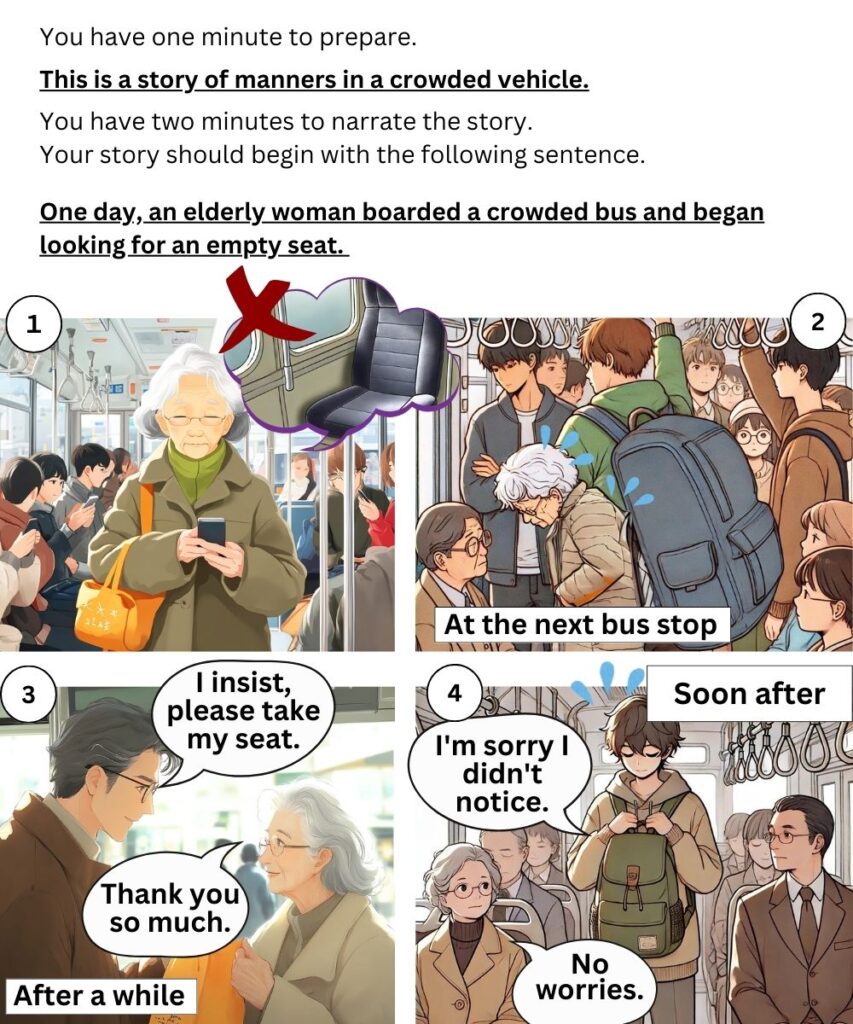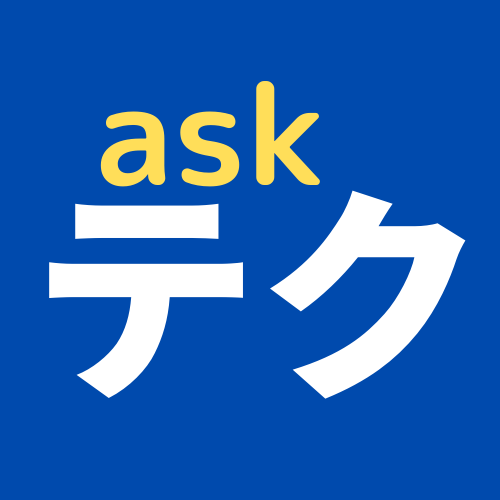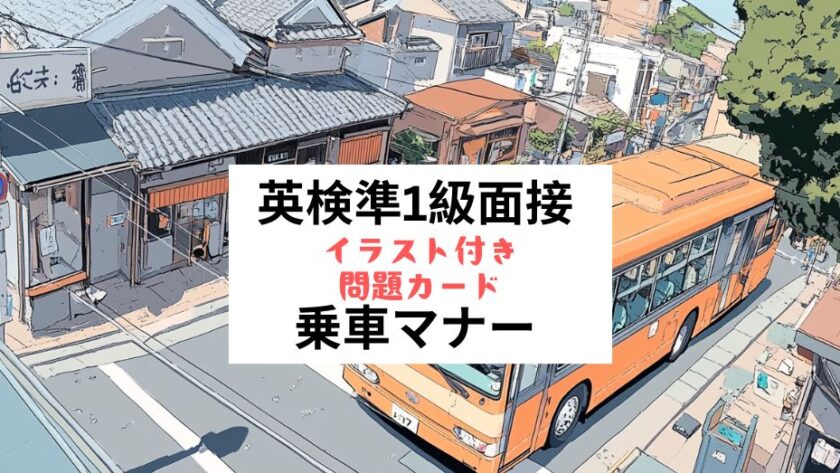実際の出題形式(問題カード)で英検準1級の面接練習を独学できるページです。
2024年度リニューアル対応!
所要時間:概ね8分
質問概要
ナレーション内容を考える(1分間)
イラストの内容を説明するナレーションを考える
ナレーション(2分間):ナレーションを始める
※2分以上続く場合は、途中でも中止させられるので注意
Q&A(No. 1):イラスト関連の質問
イラストに関連した質問。「問題カード」を見ながら解答できます。
※登場人物が考えている事などを聞かれます。
Q&A(No.2, No. 3)
問題カードに関連した、受験者の意見を問う質問
Q&A(No. 4)
問題カードのトピックに少し関係のある質問。受験者の意見を問う質問
※この<No. 4>質問文に「導入文」が追加されました。
問題カード

ナレーションと質問
ナレーション指示
<指示>Look at the pictures carefully and read the directions silently for one minute.(1分間)
<指示>Now, please begin your narration.(2分間)
Question No.1
Please look at the first picture. If you were the elderly woman, what would you be thinking?
Question No.2
Do you think that young people nowadays are less considerate of others?
Question No. 3
Do you think the number of priority seats on trains and buses is sufficient?
Question No.4
Some people say that smartphone use is lowering children’s academic performance. Do you think smartphone use has a negative impact on children?
質問音源チャレンジ
本番のように、英語の質問を聞いて答える練習をしてみましょう。
ナレーション準備
ナレーション開始
Question 1 mp3
Question 2 mp3
Question 3 mp3
Question 4 mp3
解答例
ナレーション例
<1> One day, an elderly woman boarded a crowded bus and began looking for an empty seat. All the seats were occupied by young passengers, but none of them looked up from their smartphones to offer her a seat. As the bus continued to fill up, the woman stood in the aisle, holding onto a pole for support.
ある日、高齢の女性が混雑したバスに乗り込み、空席を探した。すべての座席が若い乗客で埋まっていたが、誰もスマホから目を離さず、彼女に席を譲る様子はなかった。バスがさらに混雑する中、女性は手すりに掴まりながら立ち続けた。
イラストでは女性はスマホをもっているけど、バスが動き出したら、きっと手すりにつかまったと予想できるので、今回は「holding onto a pole for support」というフレーズを足しているよ
<2> At the next stop, a group of young people with large backpacks boarded the bus. As they made their way down the aisle, one of the backpacks accidentally bumped into the elderly woman, but the young person didn’t notice. The woman looked uncomfortable but, not wanting to cause any trouble, chose not to say anything.
次の停留所で、大きなリュックを背負った若者たちがバスに乗り込んできた。彼らが通路を進むと、そのうちの一人のリュックが偶然高齢女性にぶつかったが、若者は気づかなかった。女性は不快そうだったが、トラブルになるのを避けたかったので、何も言わなかった。
乗り物に乗り込む・降りる、の言い方をおさらいしておこう。
board : 主に乗り物(バス、電車、飛行機、船など)に「乗る, 搭乗する, 乗り込む」という意
enter (入る): 乗り物に「入る」という意味で使われることがある:The group entered the bus. (そのグループはバスに入った。)
get on (乗る): 乗り物に乗るという意味で一般的によく使われる
embark (乗船する、乗り込む): 船や飛行機などに「乗り込む」という意味で、特に長旅や大きな乗り物に対して使われることが多い
disembark (降りる、下船する):船や飛行機、バスなどの乗り物から「降りる」という意味
get off (降りる):乗り物から降りるという意味で一般的によく使われる
exit (出る、退出する:乗り物から「出る」という意味で使われることがある:The crowd exited the train. (群衆は電車を降りた。)
<3> After a while, a middle-aged man noticed the elderly woman standing and decided to offer her his seat. He gently said she should take his seat, and the elderly woman, grateful for his kindness, sat down with a word of thanks.
しばらくして、中年の男性が立っている女性に気づき、彼女に席を譲ることにした。彼は彼女に「座ってください」と優しく言い、高齢女性は彼の親切に感謝しながら席に座った。
<4> Soon after, the young person with the backpack realized what had happened and apologized, saying he hadn’t noticed. The elderly woman smiled warmly and told him not to worry, easing any tension. (185 words)
その後、リュックの若者は自分の行動に気づき、気づかなくて申し訳なかったと謝罪した。女性は温かく微笑んで、気にしなくて良いと伝え、場の雰囲気が和らいだ。
「had happened」「hadn’t noticed」など、、「過去完了形 (Past Perfect Tense)」を使っているのがミソやね。
過去のある時点よりもさらに前に起こった出来事や状態を表すために使われるよ。通常、2つの過去の出来事のうち、先に起こった方を過去完了形で表し、後に起こった方を過去形で表すよ
Question 1 解答例
質問:1枚目のイラストを見てください。もしあなたが高齢女性だったら、何を考えますか?
If I were the elderly woman standing in the aisle, I would probably be feeling a bit tired and disappointed that none of the young passengers offered me a seat. I might also be thinking about how times have changed, and how people used to be more considerate in the past.
もし私が通路でポールにつかまっている高齢の女性だったら、若い乗客の誰も席を譲ってくれないことに少し疲れと失望を感じるかもしれません。また、昔の方がもっと思いやりがあったのではないかと考えているかもしれません
「considerate = 思いやりがある、他人に配慮する、気配りができる」
Thoughtful (思いやりのある、気を使う)
Kind (親切な、優しい)
Attentive (気配りができる、注意深い)
Compassionate (思いやりのある、同情的な)
Inconsiderate (思いやりのない、不親切な)
Selfish (自己中心的な、利己的な)
Thoughtless (無神経な、配慮のない)
Indifferent (無関心な、冷淡な)
Question 2 解答例
今の若者は他人への思いやりが少ないと思いますか?
Yes, I think young people today might be less considerate of others, especially with the distraction of smartphones and technology. They often seem more focused on their devices than on what’s happening around them.
はい、最近の若者は他人に対して少し思いやりが減っているかもしれません。特にスマートフォンやテクノロジーの影響で、周りのことよりもデバイスに集中していることが多いように思います。
No, I don’t think young people are less considerate. I believe they may just express consideration differently, and technology sometimes distracts them unintentionally.
いいえ、若者が思いやりに欠けているとは思いません。彼らはただ、異なる方法で配慮を表現しているかもしれませんし、テクノロジーが時に無意識のうちに彼らを気をそらすことがあるだけだと思います。
Question 3 解答例
電車やバスの優先座席の数は十分だと思うか
Yes, I think the current number of priority seats is sufficient because it balances the needs of elderly and disabled passengers with those of other commuters. However, what’s more important is ensuring that people respect these seats and offer them to those who need them.
はい、現在の優先座席の数は十分だと思います。高齢者や障害者のニーズと、他の乗客のニーズとのバランスが取れているからです。しかし、もっと重要なのは、これらの座席を尊重し、必要な人に譲ることだと思います。
No, I believe there should be more priority seats because the elderly and disabled population is growing, and we need to accommodate their needs better to ensure they can travel comfortably and safely.
いいえ、高齢者や障害者の数が増えているので、もっと優先座席が必要だと思います。彼らが快適かつ安全に移動できるようにするためには、より多くの座席を確保する必要があります。
Question 4 解答例
スマホ利用が子供たちの学力を下げているという人々がいます。あなたはスマホ利用は子供に悪影響を与えると思いますか?
Yes, I believe that excessive smartphone use can negatively impact children’s academic performance by distracting them from their studies and reducing their attention spans. It might also lead to a lack of social interaction, which is important for their development.
はい、過度のスマホ使用は、学業への集中力を削ぐことで子供たちの学力に悪影響を与える可能性があると思います。また、社会的な交流が不足し、子供たちの成長にとって重要な部分が欠けることにもつながるかもしれません。
No, I think smartphones can be beneficial if used properly. They can provide access to educational resources and learning tools that can actually enhance children’s academic performance. The key is to ensure that they are used in a balanced and controlled manner.
いいえ、スマホは適切に使用すれば、有益だと思います。スマホは教育リソースや学習ツールへのアクセスを提供し、実際に子供たちの学力を向上させる可能性があります。重要なのは、それがバランスよく、管理された方法で使用されることです。
面接練習はask本校にお尋ねください:無料体験レッスン予約
こちらの投稿もおススメです:英検準1級面接問題カード|在宅勤務トピック質問と回答例
バス・ジョーク
ジョーク 1
Why did the bus driver quit his job?
Because he couldn’t handle the passengers anymore!
日本語訳:
バスの運転手が仕事を辞めた理由は何ですか?
もう乗客たちに耐えられなくなったからです!
解説:
このジョークは「handle」という言葉を使った言葉遊びです。”Handle” は「対処する」または「運転する」という意味があります。ここでは、乗客に対処できないことが仕事を辞めた理由としていますが、暗にバスのハンドルを操作できなくなったという意味も含まれています。
ジョーク 2
What do you call a bus full of smart people?
A brain bus!
日本語訳:
賢い人たちがいっぱい乗ったバスを何と呼びますか?
ブレインバス!
解説:
このジョークは「brain(脳)」と「bus」を掛け合わせた言葉遊びです。賢い人たちがたくさん乗っているバスを「brain bus」として、まるで知性が集まったバスであるかのように表現しています。
ジョーク 3
Why don’t buses ever get lost?
Because they always follow their routes!
日本語訳:
なぜバスは迷子にならないのでしょうか?
それはいつも決められたルートをたどるからです!
解説:
このジョークは、バスが常に決まったルートを運行するという事実を面白く表現しています。「迷子になる」というのは通常、人や動物に関する表現ですが、バスは常に定められたルートを運行するため、迷子になることはないという点を利用したジョークです。
ジョーク 4
Why was the bus so clean?
Because it went through a lot of stops!
日本語訳:
なぜそのバスはそんなにきれいだったのでしょうか?
たくさんの停留所を通ったからです!
解説:
このジョークは「stops」という言葉を使った言葉遊びです。”Stops” は「停留所」を意味しますが、同時に「止まること」という意味もあります。たくさんの停留所を通過することが、バスがきれいである理由であるというのはナンセンスで、言葉遊びによるユーモアです。
ジョーク 5
Why did the bus passenger bring a ladder?
Because he heard the bus was going to the high school!
日本語訳:
バスの乗客がはしごを持ってきたのはなぜですか?
バスが「ハイスクール」に行くと聞いたからです!
解説:
このジョークは「high school(高校)」という言葉にかけています。”High” という言葉から物理的な高さを連想させ、「学校」ではなく「高い場所」に行くと勘違いして、はしごが必要だと思ったというユーモアです。




